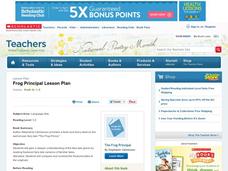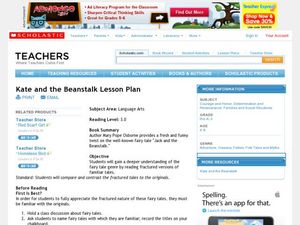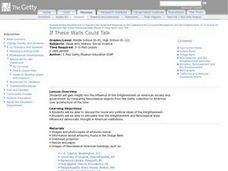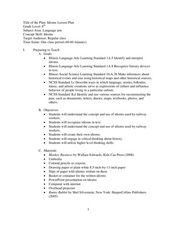Curated OER
Stories of Nepal
Students explore folktales and fairy tales from Nepal to help them understand the Nepalese culture, and to compare the stories to the ones the students may know. After reading the stories, students consider what rural life is like in...
Curated OER
Carrie's War by Nina Bawden
In this Carrie's War learning exercise, students analyze each chapter through word level, sentence level, and text level evaluations for ten chapters. Students respond to short answer questions about six characters in the book.
Curated OER
Intermediate Matching - Educational Buildings
In this educational building worksheet, students draw a line from the names of educational buildings to the corresponding definitions. There are 7 terms and definitions to match up.
Curated OER
Frog Principal Lesson Plan
Young scholars read the fractured fairy tale, The Frog Principal by Stephanie Calmenson and compare it to the original version in order to gain deeper understanding of the fairy tale genre. In this fairy tale lesson, students identify...
Curated OER
Kate and the Beanstalk Lesson Plan
Students read the story Kate and the Beanstalk in order to compare and contrast this fractured tale to the original fairy tale of Jack and the Beanstalk. In this fairy tale reading lesson plan, students first discuss the plots of many...
Curated OER
If These Walls Could Talk
Students investigate the influence of the Enlightenment on American society and government. In this Enlightenment lesson plan, students work cooperatively in groups to define the principles of the Enlightenment, American democracy, and...
Curated OER
Cleaning Up
Students demonstrate how to be a philanthropist. In this philanthropy lesson, students read the story The Wartville Wizard and discuss ways to become a philanthropist. Students participate in a good deed by volunteering to clean up trash.
Curated OER
Jackie Robinson, A Black Hero
Students explore the meaning of the word hero. In this philanthropy lesson, students examine what the word hero means as they discover Jackie Robinson and hits contributions to society.
Curated OER
The Great Depression: Part 1
Students explore the causes and effects of the Great Depression. In this Great Depression lesson plan, students analyze the economic and political causes as well as the economic, foreign affairs and political effects of the depression....
Curated OER
Rhetorical Devices
Twelfth graders identify and analyze examples of rhetorical devices as valid or invalid inferences. In this text analysis lesson, 12th graders research a controversial topic in teams and identify rhetorical devices for the topic....
Curated OER
Apple: Seed to Tree
Young scholars grow seeds of an apple and learn about Johnny Appleseed. In this apples lesson plan, students map Johnny Appleseed's travels, learn how he got his name, compare different Johnny Appleseed books, and grow apple seeds...
Curated OER
The Living Environment
Students explore the cycles of an ecosystem. In this environmental science lesson, students work in groups to research the nitrogen cycle, the water cycle, or the oxygen-carbon dioxide cycle. Students prepare a PowerPoint or other...
Curated OER
Butterfly Metamorphosis
Young scholars read a story, watch a video, and interact with a butterfly website to learn about butterfly metamorphosis. In this butterfly lesson plan, students listen, discuss, and participate in activities relating the metamorphosis...
Curated OER
Crane, London, and Literary Naturalism
Students identify the key characteristics that comprise American literary naturalism in Jack London's "To Build a Fire" and Stephen Crane's "The Open Boat." In this naturalism analysis activity, students identify characteristics of the...
Curated OER
A Webpage with Frontpage
Students design a school webpage. In this webpage design lesson, students use Frontpage software to build a successful, attractive, and informational Web page.
Curated OER
Shells Around the World
Students research a geographical region that contains shells. In this shells from around the world lesson, students take a field trip to a local shell shop (if possible) and then work in groups to research a geographical region such as...
Curated OER
Poetry Describing Ordinary Life
Students examine the cultural and historical context which a poem is written in or describes. In this poetry lesson, students listen to an online recording of Philip Larkin reading "The Whitsun Wedding." Students explore how the poem...
Curated OER
Idioms Lesson Plan
Sixth graders discover idioms. In this idioms lesson, 6th graders evaluate idioms and discover their meaning. Students read Runny Babbit by Shel Silverstein and create unique idioms. Assessment rubric is provided.
Curated OER
Learning to Summarize a Story
Students with hearing loss read independently and understand what is being read to them. In this independent reading lesson plan, students sequence and discuss the book that is read.
Curated OER
Aging of Trees
Students examine tree rings to determine its age. In this tree ring lesson, students examine core tree samples, identify the tree rings, and then determine its age. Students complete a worksheet, deciding which of the two core sample is...
Curated OER
Fly Tying
Learners practice fly tying and explain water conservation efforts in Iowa. In this ecology, Iowa geography, and natural resources lesson, students identify basic equipment and material needed to fish, then tie flies. Learners name...
Curated OER
Antisense Oligonucleotide Therapy
Students conduct Internet research on Antisense Oligonucleotide Therapy. They design a puzzle to represent these processes, read and summarize an article, conduct research, and design a theoretical experimental procedure.
Curated OER
Develop Global Perspectives of Nations and Peoples of the World
Young scholars analyze examples of the world socio-economic trends. Using those examples, they develop their own global persective of the different nations and peoples of the world. They determine the value of cultural diversity and...
Curated OER
Inquiry and the Nature of Science
High schoolers identify questions that can be answered through scientific investigations, design and conduct a scientific investigation. They also use appropriate tools and techniques to gather, analyze, and interpret data.

























